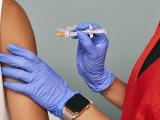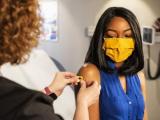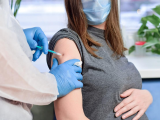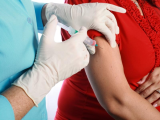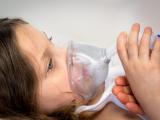Dec 14, 2004 (CIDRAP News) – As part of efforts to improve the nation's long-term supply of influenza vaccine, the federal government is launching a clinical trial to help get a German-made vaccine licensed for regular use in the United States.
The Department of Health and Human Services (HHS) announced Dec 7 it would buy 1.2 million doses of the Fluarix vaccine made by GlaxoSmithKline (GSK) Biologicals to help ease the shortage. The vaccine is used in 70 countries, but because it is not licensed in the United States, people will have to sign a form acknowledging possible risks before they receive it.
Two days after that announcement, federal officials announced plans to recruit 1,000 healthy adults for a clinical trial of the vaccine at four sites. The National Institute of Allergy and Infectious Diseases (NIAID) is collaborating with GSK Biologicals, based in Rixensart, Belgium, on the trial.
Dr. Pamela McInnes, deputy director of the NIAID's Division of Microbiology and Infectious Diseases, said the trial was prompted by the US flu vaccine shortage, which arose when contamination problems forced Chiron Corp. to cancel its shipment of 48 million doses in October. "We're doing whatever we can to secure the vaccine supply for the next season," McInnes told CIDRAP News
McInnes said the NIAID is funding the clinical components of the trial, such as recruiting volunteers and administering the vaccine, while GSK will cover some infrastructure costs and the testing of blood samples to assess the immune response. She said she couldn't estimate the cost of the trial at this point.
The trial will be conducted by four NIAID-supported Vaccine and Treatment Evaluation Units, at the University of Rochester Medical Center, Cincinnati Children's Hospital, the University of Maryland School of Medicine in Baltimore, and Baylor College of Medicine in Houston.
In the NIAID announcement, lead investigator John Treanor, MD, of the University of Rochester, said, "Although the vaccine we are testing has a very long safety record in Europe and other parts of the world, the type of study we are conducting must be done before the vaccine can be licensed for use in the United States."
Four of every five participants in the trial will receive Fluarix, while the fifth will receive a placebo, the NIAID said. Those receiving the placebo will be offered US-licensed vaccine at the end of the month-long study.
When HHS announced its plan to buy GSK vaccine last week, the company said it had long-term plans to seek a US license for the product. A Dec 9 Washington Post report quoted the company as saying it intends to sell 10 million to 20 million doses in the United States for next year's flu season if it gets a license.
In other recent flu-vaccine developments, the United Kingdom's drug regulatory agency said last week it was extending the license suspension for Chiron's Liverpool vaccine plant for another 3 months. The Medicines and Healthcare Products Regulatory Agency (MHRA) suspended the plant's license because of contamination problems Oct 5, forcing cancellation of the company's vaccine shipments to the United States.
"This new suspension does not result from any newly identified safety issues or findings at the Liverpool plant," the MHRA said. "It is routine regulatory action to give Chiron more time to carry out the extensive and detailed remedial plan which is now being put in place."
The MHRA said it was keeping the US Food and Drug Administration (FDA) well informed of developments and would include FDA inspectors on an upcoming visit to check Chiron's progress in fixing problems at the plant. The FDA has come under fire for not predicting Chiron's problems and reacting to them sooner.
"The suspension can be lifted at any time if Chiron is able to satisfy the MHRA that it has rectified the site's problems," the MHRA statement added.
Also last week, Chiron announced it had received an FDA warning letter asking for more information about the company's investigations of problems at the Liverpool plant. The letter, stemming from a remediation plan the company submitted in November, asks for more details about investigations into "current Good manufacturing Practices deviations" and related studies.
The FDA gave Chiron 15 working days to respond to the letter, the company said.
See also:
Dec 9 NIAID news release
